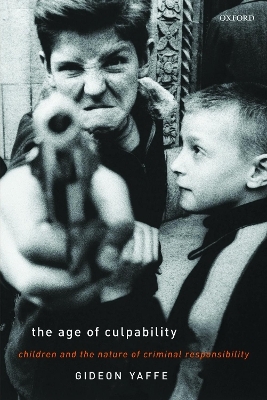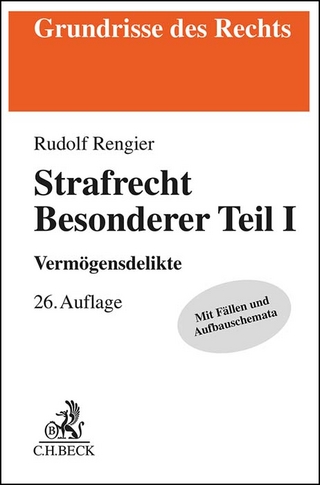
The Age of Culpability
Children and the Nature of Criminal Responsibility
Seiten
2020
Oxford University Press (Verlag)
978-0-19-886002-0 (ISBN)
Oxford University Press (Verlag)
978-0-19-886002-0 (ISBN)
Gideon Yaffe presents a theory of criminal responsibility according to which child criminals deserve leniency not because of their psychological, behavioural, or neural immaturity but because they are denied the vote. He argues that full shares of criminal punishment are deserved only by those who have a full share of say over the law.
Why be lenient towards children who commit crimes? Reflection on the grounds for such leniency is the entry point into the development, in this book, of a theory of the nature of criminal responsibility and desert of punishment for crime. Gideon Yaffe argues that child criminals are owed lesser punishments than adults thanks not to their psychological, behavioural, or neural immaturity but, instead, because they are denied the vote. This conclusion is reached through accounts of the nature of criminal culpability, desert for wrongdoing, strength of legal reasons, and what it is to have a say over the law. The centrepiece of this discussion is the theory of criminal culpability. To be criminally culpable is for one's criminal act to manifest a failure to grant sufficient weight to the legal reasons to refrain. The stronger the legal reasons, then, the greater the criminal culpability. Those who lack a say over the law, it is argued, have weaker legal reasons to refrain from crime than those who have a say. They are therefore reduced in criminal culpability and deserve lesser punishment for their crimes. Children are owed leniency, then, because of the political meaning of age rather than because of its psychological meaning. This position has implications for criminal justice policy, with respect to, among other things, the interrogation of children suspected of crimes and the enfranchisement of adult felons.
Why be lenient towards children who commit crimes? Reflection on the grounds for such leniency is the entry point into the development, in this book, of a theory of the nature of criminal responsibility and desert of punishment for crime. Gideon Yaffe argues that child criminals are owed lesser punishments than adults thanks not to their psychological, behavioural, or neural immaturity but, instead, because they are denied the vote. This conclusion is reached through accounts of the nature of criminal culpability, desert for wrongdoing, strength of legal reasons, and what it is to have a say over the law. The centrepiece of this discussion is the theory of criminal culpability. To be criminally culpable is for one's criminal act to manifest a failure to grant sufficient weight to the legal reasons to refrain. The stronger the legal reasons, then, the greater the criminal culpability. Those who lack a say over the law, it is argued, have weaker legal reasons to refrain from crime than those who have a say. They are therefore reduced in criminal culpability and deserve lesser punishment for their crimes. Children are owed leniency, then, because of the political meaning of age rather than because of its psychological meaning. This position has implications for criminal justice policy, with respect to, among other things, the interrogation of children suspected of crimes and the enfranchisement of adult felons.
Gideon Yaffe is Professor of Law and Professor of Philosophy and Psychology at Yale. He is the author of Attempts: In the Philosophy of Action and the Criminal Law (OUP 2010), as well as books about John Locke and Thomas Reid. He also collaborates with neuroscientists on experiments intended to be of relevance to criminal responsibility assessments.
Introduction
1: Immaturity and Reduce Culpability
2: Kids will be kids . . . until they grow out of it
3: Criminal Culpability
4: Desert for Wrongdoing
5: The Weight of a Legal Reason
6: Giving Kids a Break
7: Who Else is Owed a Break?
8: What Breaks are Owed?
| Erscheinungsdatum | 03.01.2020 |
|---|---|
| Verlagsort | Oxford |
| Sprache | englisch |
| Maße | 156 x 229 mm |
| Gewicht | 392 g |
| Themenwelt | Recht / Steuern ► Allgemeines / Lexika |
| Recht / Steuern ► EU / Internationales Recht | |
| Recht / Steuern ► Strafrecht ► Besonderes Strafrecht | |
| ISBN-10 | 0-19-886002-1 / 0198860021 |
| ISBN-13 | 978-0-19-886002-0 / 9780198860020 |
| Zustand | Neuware |
| Haben Sie eine Frage zum Produkt? |
Mehr entdecken
aus dem Bereich
aus dem Bereich
eine praxisorientierte Darstellung
Buch | Softcover (2024)
C.H.Beck (Verlag)
CHF 96,55
Vermögensdelikte
Buch | Softcover (2023)
C.F. Müller (Verlag)
CHF 37,80


